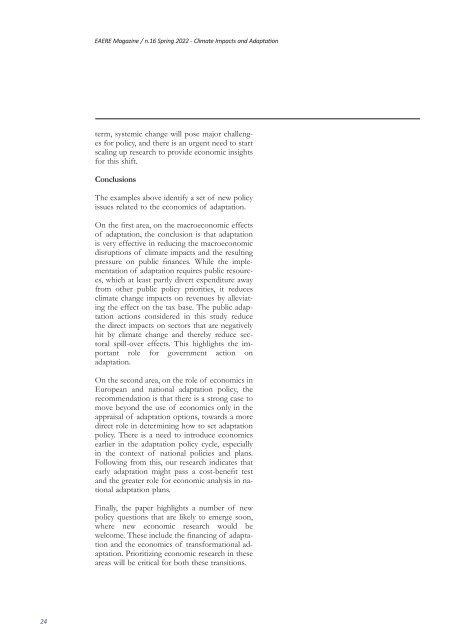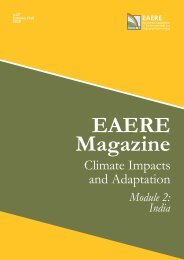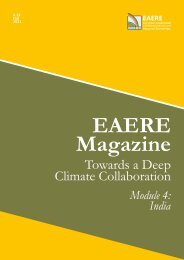<strong>EAERE</strong> <strong>Magazine</strong> / n.16 <strong>Spring</strong> <strong>2022</strong> - Climate Impacts and Adaptation term, systemic change will pose major challenges for policy, and there is an urgent need to start scaling up research to provide economic insights for this shift. Conclusions The examples above identify a set of new policy issues related to the economics of adaptation. On the first area, on the macroeconomic effects of adaptation, the conclusion is that adaptation is very effective in reducing the macroeconomic disruptions of climate impacts and the resulting pressure on public finances. While the implementation of adaptation requires public resources, which at least partly divert expenditure away from other public policy priorities, it reduces climate change impacts on revenues by alleviating the effect on the tax base. The public adaptation actions considered in this study reduce the direct impacts on sectors that are negatively hit by climate change and thereby reduce sectoral spill-over effects. This highlights the important role for government action on adaptation. On the second area, on the role of economics in European and national adaptation policy, the recommendation is that there is a strong case to move beyond the use of economics only in the appraisal of adaptation options, towards a more direct role in determining how to set adaptation policy. There is a need to introduce economics earlier in the adaptation policy cycle, especially in the context of national policies and plans. Following from this, our research indicates that early adaptation might pass a cost-benefit test and the greater role for economic analysis in national adaptation plans. Finally, the paper highlights a number of new policy questions that are likely to emerge soon, where new economic research would be welcome. These include the financing of adaptation and the economics of transformational adaptation. Prioritizing economic research in these areas will be critical for both these transitions. 24
The EU Module References Bachner, G., Bednar-Friedl, B., & Knittel, N. (2019). How does climate change adaptation affect public budgets? Development of an assessment framework and a demonstration for Austria. Mitigation and Adaptation Strategies for Global Change, 24(7), 1325–1341. Botzen, W., Ignjačević, P., Kuik, O. J., Tesselaar, M., Tiggeloven, T., Bachner, G., Bednar‐Friedl, B., Grossmann, W., Knittel, N., Steininger, K., Williges, K., Bosello, F., Dasgupta, S., Standardi, G., Parrado, R., Watkiss, P., Cimato, F., Hunt, A, Boere, E., Valin, H., Hinkel, J., Lincke, D., Costa, A.L., van Ginkel, K., de Groen, F., Haasnoot, M., & Jeuken, A. (2020). Socio‐economic tipping point analysis: Report D3. 4 for the project CO‐designing the Assessment of Climate CHange costs (COACCH). CCC. (2021). Independent Assessment of UK Climate Risk. Advice to Government For The UK’s Third Climate Change Risk Assessment (CCRA3). Climate Change Committee. Climate Policy Initiative. (2021). Global Landscape of Climate Finance 2021. https://www.climatepolicyinitiative.org/publication/globallandscape-of-climate-finance-2021. Defra. (2020). Accounting for the Effects of Climate Change: Supplementary Green Book Guidance. https://assets.publishing.service.gov.uk/ government/uploads/system/uploads/attachment_data/file/934339/ Accounting_for_the_Effects_Of_Climate_Change_-_Supplementary_ Green_Book_.._.pdf Dittrich, R., Wreford, A., & Moran, D. (2016). A survey of decisionmaking approaches for climate change adaptation: Are robust methods the way forward? Ecological Economics, 122, 79 - 89. https://doi. org/10.1016/j.ecolecon.2015.12.006 EC. (2017). Climate mainstreaming in the EU budget - Preparing for the next MFF: Final report. European Commission. https://op.europa. eu/en/publication-detail/-/publication/1df19257-aef9-11e7-837e- 01aa75ed71a1 EC. (2021). COMMUNICATION FROM THE COMMISSION TO THE EUROPEAN PARLIAMENT, THE COUNCIL, THE EUROPEAN ECONOMIC AND SOCIAL COMMITTEE AND THE COMMITTEE OF THE REGIONS Forging a climate-resilient Europe - the new EU Strategy on Adaptation to Climate Change. COM/2021/82 final. Published by the European Commission. Available at https://eur-lex.europa.eu/legal-content/EN/ TXT/?uri=COM:2021:82:FIN Roberts, M. Tignor, E.S. Poloczanska, K. Mintenbeck, A. Alegría, M. Craig, S. Langsdorf, S. Löschke, V. Möller, A. Okem, B. Rama (eds.)]. Cambridge University Press. In Press. Knittel, N., Jury, M. W., Bednar-Friedl, B., Bachner, G., & Steiner, A. K. (2020). A global analysis of heat-related labour productivity losses under climate change—implications for Germany’s foreign trade. Climatic Change, 160(2), 251-269. Kompas, T., Pham, V.H., & Che, T.N. (2018). The Effects of Climate Change on GDP by Country and the Global Economic Gains from Complying with the Paris Climate Accord. Earths Future, 6, 1153–1173. https://doi.org/10.1029/2018EF000922 Mullan, M., Kingsmill, N., Agrawala, S., & Matus Kramer, A. (2015) National Adaptation Planning: Lessons from OECD Countries. In: Leal Filho W. (eds) Handbook of Climate Change Adaptation. <strong>Spring</strong>er, Berlin, Heidelberg. https://doi.org/10.1007/978-3-642-38670-1_38 Network for Greening the Financial System (NGFS). (2019). A Call for Action Climate Change: Climate change as a source of financial risk. Network for Greening the Financial System, First comprehensive report. https://www.ngfs.net/en UNEP. (2016). The Adaptation Finance Gap Report 2016. Nairobi: United Nations Environment Programme,. UNEP (2021). The Adaptation Gap Report 2021. Nairobi: United Nations Environment Programme. Ward, P.J., Jongman, B., Aerts, J.C.H., Bates, P., Botzen, W.J.W., Diaz-Loaiza, A., Hallegatte, S., Kind, J.M., Cornelis, J., Kwadijk, J., Scussolini, P., & Winsemius, H.C. (2017). A global framework for future costs and benefits of river-flood protection in urban areas. Nature Climate Change, 7, 642–646. https://doi.org/10.1038/ nclimate3350. Watkiss, P. & Betts, R. (2021). Climate Change Risk Assessment 3 Evidence Report. Chapter 2. Method. Watkiss, P. & Cimato, F. (eds). (2020). What Does Transformational Adaptation Look Like? Literature review synthesis paper. Deliverable 10 of the Resilient Regions: Clyde Rebuilt project. Glasgow, Scotland: Clyde Rebuilt. http://climatereadyclyde.org.uk/wp-content/ uploads/2020/12/What-does-transformational-adaptations-looklike-FINAL2.pdf, EC. (2021b). Climate Change Adaptation Mission. Implementation Plan. https://ec.europa.eu/info/sites/default/files/research_and_ innovation/funding/documents/climat_mission_implementation_ plan_final_for_publication.pdf EEA. (<strong>2022</strong>). Climate-ADAPT. https://climate-adapt.eea.europa.eu/ countries-regions/countries EEA. (<strong>2022</strong>b). Climate-ADAPT. Adaptation Support Tool. https:// climate-adapt.eea.europa.eu/knowledge/tools/adaptation-supporttool Hof, A.F, Boot, P., van Vuuren, D.P., & van Minnen, J. (2014). Costs and benefits of climate change adaptation and mitigation: An assessment on different regional scales. PBL publication number 1198, The Hague, PBL Netherlands Environmental Assessment Agency. http://www.pbl.nl/ sites/default/files/cms/publicaties/PBL_2014_Costs_and_benefits_ of_climate_change_adaption_and_mitigation_1198.pdf HMT. (<strong>2022</strong>). The Green Book. Her Majesty’s Treasury. https://www. gov.uk/government/publications/the-green-book-appraisal-andevaluation-in-central-governent/the-green-book-2020 Kahn, M.E., Mohaddes, K., Ng, R.N.C., Pesaran, M.H., Raissi, M., &Yang, Y-C. (2019). Long-Term Macroeconomic Effects of Climate Change: A Cross-Country Analysis. IMF Working Paper, October 2019. IPCC. (<strong>2022</strong>). Climate Change <strong>2022</strong>: Impacts, Adaptation, and Vulnerability. Contribution of Working Group II to the Sixth Assessment Report of the Intergovernmental Panel on Climate Change [H.-O. Pörtner, D.C. 25













